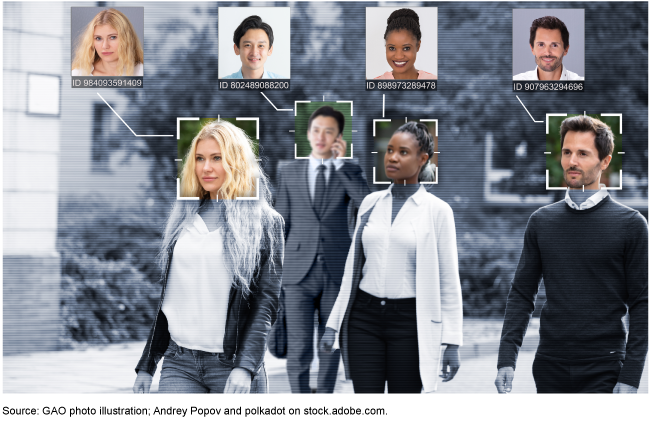Facial Recognition Technology: Federal Law Enforcement Agencies Should Have Better Awareness of Systems Used By Employees
Fast Facts
We testified about how 42 federal agencies that employ law enforcement officers use facial recognition technology.
- 20 reported owning such systems or using systems owned by others
- 6 reported using the technology to help identify people suspected of violating the law during the civil unrest, riots, or protests following the death of George Floyd in May 2020
- 3 acknowledged using it on images of the U.S. Capitol attack on Jan. 6
- 14 reported using non-federal systems
In a related report, we recommended that 13 agencies track employee use of non-federal systems and assess the risks these systems can pose regarding privacy, accuracy, and more.

Highlights
What GAO Found
In June 2021, GAO reported the results of its survey of 42 federal agencies that employ law enforcement officers about their use of facial recognition technology. Twenty reported owning systems with the technology or using systems owned by other entities, such as state, local, and non-government entities (see figure).
Ownership and Use of Facial Recognition Technology Reported by Federal Agencies that Employ Law Enforcement Officers

Note: For more details, see figure 1 in GAO-21-105309.
Agencies reported using the technology to support several activities (e.g., criminal investigations) and in response to COVID-19 (e.g., verify an individual's identity remotely). Six agencies reported using the technology on images of the unrest, riots, or protests following the killing of Mr. George Floyd in May 2020. Three agencies reported using it on images of the U.S. Capitol attack on January 6, 2021. Agencies said the searches used images of suspected criminal activity.
Fourteen of the 42 agencies reported using the technology to support criminal investigations. However, only one had a mechanism to track what non-federal systems were used by employees. By having a mechanism to track use of these systems and assessing the related risks (e.g., privacy and accuracy-related risks), agencies can better mitigate risks to themselves and the public.
Why GAO Did This Study
Federal agencies that employ law enforcement officers use facial recognition technology to assist criminal investigations, among other activities. For example, the technology can help identify an unknown individual in a photo or video surveillance.
This statement describes (1) the ownership and use of facial recognition technology by federal agencies that employ law enforcement officers, (2) the types of activities these agencies use the technology to support, and (3) the extent that these agencies track employee use of facial recognition technology owned by non-federal entities, including the potential privacy and accuracy implications.
This statement is based on GAO's June 2021 report on federal law enforcement's use of facial recognition technology (GAO-21-518). To conduct that prior work, GAO administered a survey questionnaire to 42 federal agencies that employ law enforcement officers regarding their use of the technology. GAO also reviewed relevant documents and interviewed agency officials. The June 2021 report was a public version of a sensitive report that GAO issued in April 2021. Information that agencies deemed sensitive was omitted from the June 2021 report and this statement.
Recommendations
In June 2021, GAO made two recommendations to each of 13 federal agencies to implement a mechanism to track what non-federal systems are used by employees, and assess the risks of using these systems. Agencies generally concurred with the recommendations.
